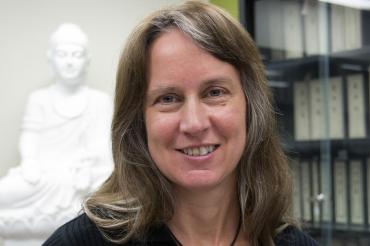Buddhist expert Frances Garrett talks about U of T's new Centre for Buddhist Studies

Published: December 5, 2016
Buddhist studies scholar Frances Garrett has been appointed as the inaugural director of the newly launched Robert H. N. Ho Family Foundation Centre for Buddhist Studies at the University of Toronto. The centre, which is part of the department for the study of religion at the Faculty of Arts & Science, was established thanks to a gift from the Hong Kong-based Robert H. N. Ho Family Foundation.
U of T's Diana Kuprel talked with Garrett, an associate professor of Tibetan and Buddhist studies and the associate chair of the department for the study of religion, about the study of Buddhism, what it has to offer contemporary society and what inspired her as a teacher.
What initially intrigued you about Buddhism that you decided to devote your career to it?
I went to India on a study abroad program when I was an undergraduate student at Columbia University. We lived in a Buddhist monastery for a semester and traveled around to sites important in the history of Buddhism. That was such an influential experience for me, which is partly why I’m so supportive of such opportunities for our undergraduates now.
What is your main research project?
I’m just wrapping up a big collaborative project, working with a team of scholars and students in China. We are documenting a group of stories about healing, illness and medical knowledge in the epic of King Gesar, a cycle which is known across inner Asia, most widely by Tibetans and Mongolians. It is the most important shared cultural narrative for millions of people across this massive region of Asia, similar to the Ramayana or Mahabharata for South Asians or the epics of Homer in the West.
In another project, I have a team of students involved in developing an online Classical Tibetan course focused on learning to read Buddhist texts that is funded by grants from the Canadian government. This open-access language course utilizes digital texts in Tibetan that are tagged with grammatical parts of speech. There is no other Tibetan language course that utilizes digitized and tagged Classical Tibetan texts in this way.
You were recruited to U of T in 2003. How has the move been important to you as a scholar and teacher?
The quality and diversity of students here is probably what I’m most grateful for. My teaching practice is substantially collaborative. So at both the graduate and undergraduate levels, I’ve involved students in a variety of research-oriented and experiential-learning opportunities. My graduate students have participated in a number of Buddhist studies and digital humanities working groups and research programs that I’ve organized at U of T and elsewhere, and I’ve taken graduate and undergraduate students on research and study trips in India and China.
Teaching in a large multicultural city like Toronto makes all kinds of things possible that would be more difficult elsewhere. I taught a course on oral history that engaged students with members of the Buddhist community in Toronto, for example, and trained students in technologies to create complex websites based on their own research. In another course, student teams visited 22 Buddhist centres in Toronto and their research was placed on a website, georeferenced to provide a student-run multimedia study of Buddhist communities in the area.
We also have a growing set of international programs, and more and more students are studying abroad. Earlier this year, for example, I co-led a group of students on a trip to India to study Buddhist pilgrimage. This trip will run again next spring. In my view, teaching begins with thinking deeply about what learning involves, and how and where it occurs. It is sustained by creatively experimenting with methods of engaging students. Through this process of working with students, I continue to learn as a teacher and researcher myself.
Why is it so important to have this centre at the University of Toronto at this time?
Over the last decade, our Buddhist studies faculty and student body have grown substantially, and we now have the largest program in Buddhist studies in Canada. The group generates a lot of energy and excitement, and throughout the year we host so many events and visitors. This is the perfect time to open a new centre, which will provide a focused home for our activities and help us reach out to new communities interested in Buddhist studies.
Why is the interest growing?
Our undergraduate students have a really wide range of interests, and courses in our programs lead many of them into independent research. In the past couple of years, for example, we’ve had undergraduate students in Buddhist studies interviewing traditional doctors in Himalayan villages and medical camps, doing textual research while learning Pali and Burmese, and surveying Buddhist and other religious traditions in the northern Indian state of Sikkim.
Our graduate students are similarly diverse with a large cohort now doing research on topics such as Buddhist practices supporting women’s health or end-of-life care, Buddhist epic and biographical literature, Buddhist manuscript and print culture, strategies of Buddhist revival in Mongolia, Nepal and Myanmar, and diasporic Buddhist communities around the world.
What are some of the lessons that Buddhism, and its scholarly study can teach us today?
The study of Buddhist traditions around the world can help all of us think more carefully and sensitively about a range of cultural and historical issues. How do people construct themselves as members of society? How do they decide on values that work for open-minded communities? How can traditions grow in response to creativity and change?
These are questions that are central in classrooms of Buddhist studies, as well as to those who study other religions of the world. Opening our horizons to ideas and practices that are new to us is one of the foundations of learning in the humanities – and this can happen every day here in a course on Buddhist studies.



